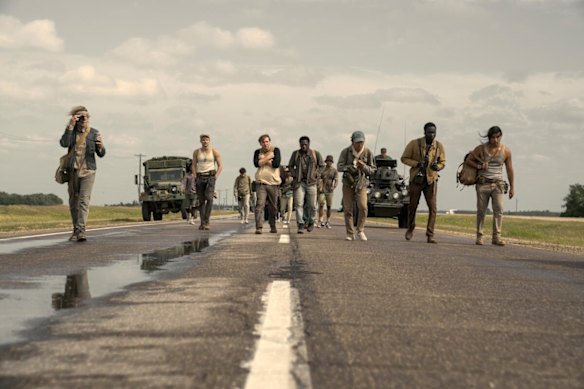
The Long Walk, a new film directed by Francis Lawrence, presents a chilling vision of a dystopian future, marking one of the bleakest entries in the young-adult film genre. Adapted from a novel by Stephen King, published under a pseudonym in 1979, the film explores themes of survival and despair. The narrative follows a competition where fifty youths must walk along a rural highway until only one remains, a premise that resonates deeply with contemporary anxieties.
The film’s storyline unfolds in an alternate America, one that is even more troubled than the current reality. Participants in this harrowing contest face strict rules: they cannot pause for long, stray off the path, or reduce their walking speed below three miles per hour. Those who fail to comply are shot by soldiers accompanying them. This grim setup serves as a stark backdrop for the film’s exploration of human resilience and the moral dilemmas faced by the characters.
Grim Realities and Philosophical Undertones
Lawrence, known for his work on the Hunger Games series, collaborates with screenwriter JT Mollner to create a film that retains the original’s unsettling essence without overtly modernizing the material. The film’s aesthetic hints at the 1970s, with costumes and settings that evoke a sense of nostalgia while remaining relevant to today’s viewers. Notably, the cast reflects a more diverse racial representation than what may have initially been conceived by King.
The film’s violence is portrayed with a raw intensity that surpasses the more sanitized depictions found in Hunger Games adaptations. King himself insisted on maintaining this level of gruesomeness as an executive producer. Yet, despite its dark themes, the film’s tone remains earnest, steering clear of cynicism. The narrative delves into the profound conversations between the remaining contestants, particularly focusing on the rebellious character, Raymond Garrity (played by Cooper Hoffman), and his fatalistic friend, Peter McVries (portrayed by David Jonsson).
The film’s exploration of mortality and the human condition is accentuated by the presence of Mark Hamill, who plays the officer overseeing the contestants. His character’s chilling demeanor and cryptic references to aspirations of making America “great again” add a layer of complexity to the narrative, inviting viewers to reflect on the implications of power and control in society.
Ultimately, The Long Walk stands as a poignant commentary on the struggles of youth in a world fraught with challenges. By revisiting a foundational work in the dystopian genre, Lawrence and Mollner offer audiences a thought-provoking experience that lingers long after the credits roll. With a runtime of 107 minutes, this film invites viewers to confront the uncomfortable realities of competition and survival in an increasingly chaotic world.






